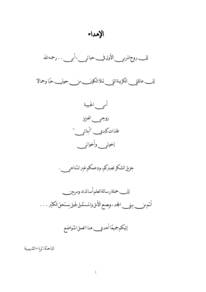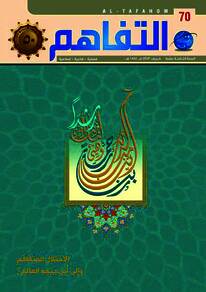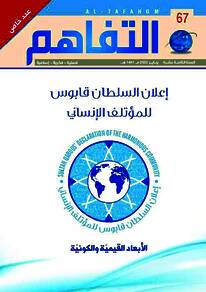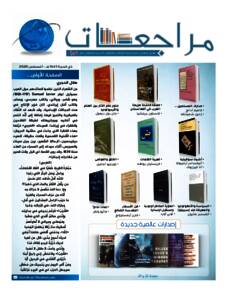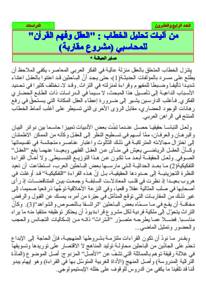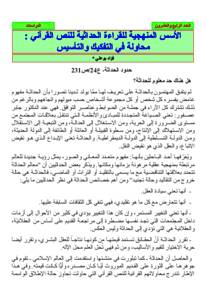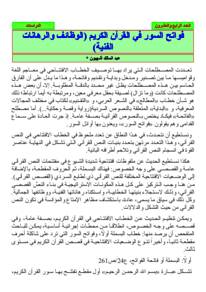وثيقة
أثر استخدام استراتيجية الصف المقلوب في تطبيق الطالبات أحكام التلاوة وفي المشاركة الصفية بمادة التربية الإسلامية في ضوء تحصيلهن الدراسي
الناشر
جامعة السلطان قابوس
ميلادي
2019
اللغة
العربية
الموضوع
الملخص الإنجليزي
The study aimed at revealing the impact of using the flipped classroom strategy on students' application of Quranic verses recitation and their classroom participation in Islamic education subject in the light of students' academic achievement. The study used the semi-experimental approach. The study subjects consisted of (137) female students of grade 8 basic education in Oman. The subjects was divided into two groups: experimental group -consisting of (71) female students – which was taught by applying the flipped classroom strategy, and the control group - consisting of (66) female students – that was taught using the ordinary teaching methods.
The study applied an oral test for the recitation rules. The validity was verified through content validity and face validity. The reliability was verified by the Inter-Rater reliability where the average ratio of agreement among the correctors, and the Internal Consistency "Alpha Kronbach". The study also used classroom observation form after verifying its validity through arbitrators' validity and convergent validity, as well as its reliability using several observers on one student, then calculated the similarity factor of the performance, the average ratio of agreement among the observers. The researcher also rewrote the educational content targeted by the experimental treatment in the study according to the flipped classroom strategy, and created the materials needed for the study, including: teacher's guide, classroom activities handbook, classroom assignments file, and students' preparation file.
In order to answer the study questions and the related hypothesis test, the researcher used (Two Way ANCOVA) test and (Two Way ANCOVA- Repeated Measures) test, the results showed the following:
- There is a statistically significant difference at the level of significance (α=0,05) in the application of recitation rules among grade 8 students due to the teaching method (flipped classroom strategy, ordinary teaching method) after controlling the impact of the pre-oral test in favor of the experimental group students.
- There is a statistically significant difference at the level of significance (α=0,05) in the application of recitation rules among grade 8 students due to the academic achievement (high, and low) in favor of the experimental group with high academic achievement.
- There is a statistically significant difference at the level of significance (α=0,05) in the classroom participation among grade 8 students in Islamic
و
education subject due to the teaching method (flipped classroom strategy, ordinary teaching method) in favor of the experimental group.
- There is a statistically significant difference at the level of significance (α=0,05) in the classroom participation among grade 8 students in Islamic education subject due to the teaching method (flipped classroom strategy, ordinary teaching method) according to the lesson topic (recitation, Tajweed, conditions of Hajj).
- The classroom participation of the experimental group students is better than those in the control group in the three lessons. Classroom participation of each group is similar in the three lessons. In addition, classroom participation of the experimental group students was better in "recitation" lesson, while classroom participation of the control group students was better in "conditions of Hajj" lesson than "recitation and tajweed" lessons.
- There is a statistically significant difference at the level of significance (α=0,05) in the classroom participation in Islamic education subject due to the teaching method (flipped classroom strategy, ordinary teaching method) among grade 8 students of the academic achievement (high, and low) in favor of the experimental group with high academic achievement.
- There are no statistically significant differences between the students averages in the experimental and control groups among grade 8 students of the academic achievement (high, and low) according to the lesson topic (recitation, tajweed, conditions of Hajj).
The study offered a number of recommendations based on its findings, including: using the flipped classroom strategy in teaching Islamic education subject in general and in teaching recitation lessons in particular, in different educational stages. Besides. The study recommends the training educators and supervisors of Islamic education subject on the practical applications of using the flipped classroom strategy in teaching recitation and memorization of the Qur'anic verses, that is through special training programs set for this purpose. In addition, it encourages training teachers of Islamic education subject on designing and managing the educational activities that enhance learning, taking into consideration including active learning strategies during applying the flipped classroom strategy. Finally, the study recommends developing classroom tasks and activities that are designed to increase dialogue and cooperation between the student and teacher.
الوصف
رسالة جامعية
المجموعة
URL المصدر
قالب العنصر
الرسائل والأطروحات الجامعية

